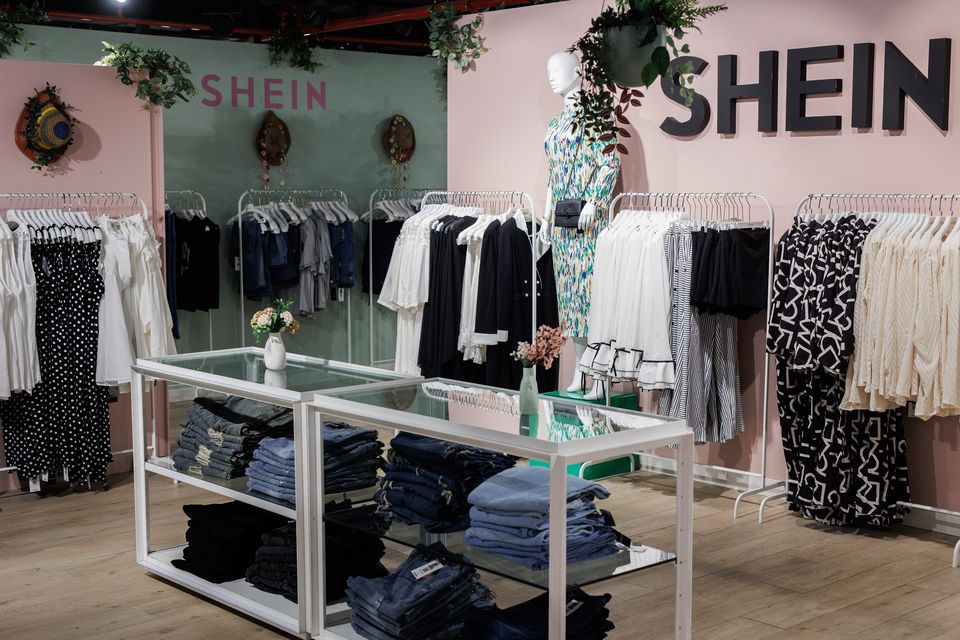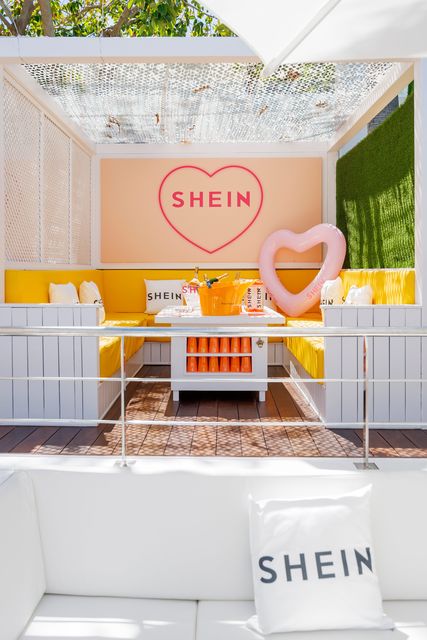Either way, you might soon be seeing more of Shein (pronounced “she-in”) and its mysterious billionaire founder in the coming days, as the hyper-fast fashion brand looks to file for a London stock market listing as soon as this week.
According to insiders, the China-founded clothing giant — widely regarded by critics as “the unstoppable face of throwaway fast fashion” — is set to confidentially file its intention to float with UK regulators after tensions between Beijing and Washington threw a spanner in the works of its plans for an IPO in New York.
If the plans are accepted, it would be one of the largest deals for the London Stock Exchange in a decade, with an initial IPO likely to value the company at around $66bn (£51.7bn) — a boost to the beleaguered stock market after Brexit, but a kick in the teeth for UK fashion brands and a worrying middle finger up to campaigners calling for an end to the crisis that is fast fashion.
MADRID, SPAIN – APRIL 26: Clothes hanging on a donkey during the opening of Shein’s ephemeral store, at ABC Serrano, on 26 April, 2024 in Madrid, Spain. (Photo By Alejandro Martinez Velez/Europa Press via Getty Images)
Unethical factory conditions that some say verge on forced labour, “nightmare” environmental practices and alarmingly cheap prices fuelling unfair competition are among the criticisms of Shein in recent years. Tory MP Tom Tugendhat recently called the company a “sinister cross between surveillance and capitalism” for its race-to-the-bottom prices, wasteful consumerism and data harvesting (Shein has come under fire for using algorithms to spy on users’ internet browsing). Just months later, his own Conservative colleague Jeremy Hunt is now in planning talks with Shein’s executive chairman Donald Tang — the latest in a series of both Conservative and Labour ministers seemingly courting Tang in a bid to woo the brand to London.
So how did it Shein do it, exactly? The brand’s rise to world domination might have something to do with its numbers, which are as alarming as they are dizzying: more than two million items in stock including up to 10,000 new products being listed per day, shipment to more than 220 countries across the world, just two per cent of clothing being unsold compared to a 30 per cent industry-average.
The hashtag #sheingals — a way for fans to show off their new purchases — has had more than 143,000 posts on TikTok, the platform most commonly used to market Shein’s products, where shoppers are encouraged to post “haul” videos trying on piles of its clothes in return for points and discounts.
It’s now the world’s most-Googled clothing brand and worth more than £50 billion, all of which makes the fact that so little is known about founder Chris Xu — an SEO whizzkid from a poor Chinese family who’s been called the world’s most anonymous CEO — even more mystifying.
From Xu’s humble beginnings to accusations of forced labour and sexualising young girls, here’s how Shein’s £2 bikini model became big business.
MADRID, SPAIN – APRIL 26: Clothes hanging on a donkey during the opening of Shein’s ephemeral store, at ABC Serrano, on 26 April, 2024 in Madrid, Spain.(Photo By Alejandro Martinez Velez/Europa Press via Getty Images)
The SEO whizzkid who started out selling teapots
If you’ve not heard of Shein you’ve almost certainly not heard of Xu Yangtian, the brand’s mysterious billionaire founder more commonly known by his English names, Chris Xu or Sky Xu, who’s somehow managed to become one of China’s richest men whilst staying almost entirely under the public radar.
Xu is no Zuckerberg or Bezos in his public persona — even his own staff don’t recognise him, according to insiders — but the success of his global empire certainly suggests a ruthlessness to match his business rivals.
He reportedly grew up in a poor family in Zibo, an industrial city in China’s Shandong province, his parents both working in factories. He went onto study international trade at Qingdao University of Science and Technology in Qingdao, a city 165 miles away from Zibo, and taught himself search-engine optimisation (SEO) as a side hustle, buying himself several online domains and building a digital business brokering Chinese-made industrial products such as gaskets.
By 2012, Xu and his business partners changed their focus to selling wedding dresses under the website name SheInside, based out of the Chinese city of Nanjing. Roughly three years later, in 2015, Xu had expanded his site to selling other women’s clothes, shortening the name to Shein, launching an app and moving the company’s headquarters to Guangzhou as well as opening an office in the US. Shein, the fast fashion megalith we know today, was born.
IBIZA, SPAIN – MAY 03: Atmosphere during the SHEIN opening party at O Beach Ibiza on May 03, 2024 in Ibiza, Spain. (Photo by Xavi Torrent/Getty Images for SHEIN)
Rumours of what Xu is like to work with are rare and conflicting: while one anonymous staffer anecdote claims Xu is “always in meetings, never lazy, and always trying to learn all the good things about you” no matter what time of the day, “even if it is two or three o’clock in the morning”, another paints a rather less flattering picture. According to two former business partners of Xu’s, they once turned up to work to find he’d “kicked [them] out of the game”, ignoring their calls and taking Shein’s PayPal accounts with him.
Xu has largely remained in the shadows throughout the whole expansion. He refuses interviews and rarely speaks publicly outside of press releases, reportedly garnering a $10.5 billion net worth and residing in Singapore.
From a Chinese wedding dress site to the world’s most popular fashion brand
Five years ago, even many of Shein’s most avid shoppers had barely heard of the low-cost fashion site. But all of that changed during the pandemic when the company’s winning formula of hyper-efficient, algorithm-led supply chains, Gen Z-friendly social media and string of high-profile celebrity ambassadors quickly made it one of the biggest brands in the world. Katy Perry and Rita Ora joined its A-listers seen wearing its clothing and Shein’s sales climbed tenfold in the space of just two years, from $10 billion in 2020 to an incredible $100 billion in 2022, leaving the likes of Asos and Boohoo rattled.
Rather than building a unique Shein aesthetic, it mostly mimics other brands’ most popular items — and fast. Its production lines leap into action to manufacture replicas of other brands’ hero pieces, with new products pumped out in as little as three days. Other brands monitor trends like this too, of course. Shein just does it more quickly and for lower production costs than all the rest. According to Shein’s CEO and one of Xu’s co-founders Molly Miao, just 50-100 pieces of each product are initially produced, before it becomes popular and is then mass-produced.
IP theft, eco criticisms and forced labour accusations
Sexualising young girls. Exploiting its workers in unsafe conditions for just 2p an hour. Emitting the same amount of carbon dioxide as 180 coal-fired power plants. These are just some of the criticisms that have been aimed at Shein over recent years, with commentators calling the company a “tumble-dryer of tat” and a “perfectionist of manipulation and exploitation” that’s just the latest example of the insidious nature of fast fashion’s hyper-fast business model.
Many of the criticisms aimed at the fashion retailer began in 2022, when a Channel 4 documentary found the brand’s factory workers being subjected to gruelling 17-hour shifts ands 75 hour weeks for just $20 a day (which would then be docked by $14 if any garments had any imperfections), alongside dangerous working conditions and a lack of fire safety. Staff appeared to be exhausted, unhappy and often shouted at by their supervisors, working into the night to get their work done — claims that led to I’m A Celebrity winner Georgia Toffolo to terminate her contract with the fashion outlet early.
Chris Xu of Shein
Shein responded to the accusations at the time, saying it was “extremely concerned” by the claims presented by Channel 4, and that it would terminate any partnerships that did not meet its standards. Later that year, it announced plans to invest $15 million to upgrade hundreds of factories belonging to its suppliers, but a report last month found that workers in some factories supplying Shein are still working 75-hour weeks.
The brand’s manufacturing process has also been called an “environmental nightmare” for its use of non-biodegradable polyester fabrics and its churning out of endless “trend”-led clothes that are likely to be discarded for landfill after just a few washes and only add rocket fuel to the crisis that is the current 10 per cent of global carbon emissions released by the fashion industry. According to fashion report Synthetics Anonymous 2.0, the company churns out the same amount of carbon dioxide as roughly 180 coal-fired power plants, leaving about 6.3 million tonnes of CO2 in its trail per year.
The company argues that its business model “balances consumers’ wants and needs and the inventory process”. But the criticisms haven’t stopped there. Shein has come under fire for sexualising young girls, reportedly selling “sexy” clothes including padded bikinis for children as young as six months. The average age of Shein’s customers is reportedly 35, a fact critics say is one of the biggest issues with the brand as it’s being bought by customers who should know better than to treat clothes as disposable items to be constantly replenished.
Shein has also found itself in endless lawsuits with Temu, another China-born online discount retailer, which is currently suing the brand over what it alleges are anti-competitive practices. There are also increasing concerns about the company’s data-harvesting.
A milestone for London — or a step in the wrong direction?
Shein has, as many expected, been going to great lengths to clean up its act since these criticisms began. It has published a modern slavery statement on its website, confirming that it pays fair wages in accordance with applicable laws of the countries in which it operates and saying it has “zero tolerance” for forced labour. In response to the eco criticisms, it argues that its business model “balances consumers’ wants and needs and the inventory process” and that it “does its best” to source recycled fabrics.
It has also cut its ties with China. The brand has de-registered its original company based in Nanjing and no longer sells products in China, moving its headquarters to Singapore and setting up operations in Turkey, Poland and Ireland. Earlier this year, it also hired a set of Washington lobbyists to highlight its US expansion plans ahead of a potential initial public offering.
That listing on the New York Stock Exchange might be off the cards for now as tensions between Washington and Bejing escalate, but a London listing is looking increasingly likely, with Shein reportedly planning to file paperwork for a potential London share listing as soon as the next few days.
Critics have been quick to call a Shein IPO “the exact opposite of what [London] should be trying to attract” and a kick in the teeth for British fashion brands as commentators call it one of the most contentious potential London Stock Exchange deals of recent years.
Patrick Grant, The Great British Sewing Bee guru who lobbied the government to remove VAT on clothing repairs, said he was troubled to see the news of Labour ministers courting Shein — and not simply because he disagrees with fast fashion, but because he genuinely believes Shein will fall and has no long term future as a company.
Just look at the effect on ASOS and Boohoo when Shein came along, he points out. “There is absolutely nothing that makes me think Shein is any different to any of these other businesses. They’re just a company pumping out the same low quality, low design stuff that everybody else is. Consumers in that category have absolutely no loyalty. Someone will come along who is cheaper and nastier.”
Whether the deal will go ahead and Grant will be proved right remains to be seen, but you might want to perfect your Shein pronunciation in the coming days. The unstoppable face of fast fashion might just be the latest in a stream of fast fashion companies battling it out for global dominance in the world of £2 bikinis, but for now, at least, that £50bn, £2 bikini-machine doesn’t seem to be slowing down anytime soon.




